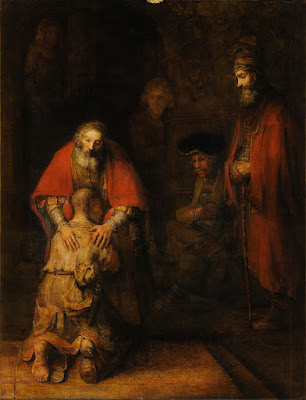As David has sung, we are called to taste and see the goodness of God (Psalm 34:9). One important element of the goodness of God is His mercy. Through today’s Scripture Readings (Micah 7:14-15, 18-20; Psalm 103:1-2, 3-4, 8a, 9-10, 11-12; Luke 15:1-3, 11-32), God invites us to “taste and see” His mercy on us to restore our broken relationship with Him. So, we acknowledge how our sins have damaged the relationship with our sincere contrition and return to God to be healed and to restore the relationship by His mercy.
Our sins will lead us to misery. So, the Israelites
had lost Jerusalem and Temple to the hands of the Babylonian invaders.
Nevertheless, as reflected in the First Reading (Micah 7:14-15, 18-20), which
is a prayer of prophet Micah, God delivers the Israelites from where they were
lost in exile and shepherd them back to Jerusalem, evoking how He delivered
them from the suffering of slavery in Egypt to the promised land of prosperity
in Canaan.
This prayer of Micah is about the post-exilic hope
to restore the Israelites’ worship, their holy city of Jerusalem and its
Temple. As written in the Book of Ezra,
the Book of Nehemiah, Ezekiel 39:21-48:35, God shepherded the Israelites from
the Babylonian exile to Jerusalem and His mercy led the restoration of their
relationship with God, symbolized with the restored city and the Temple.
In the Gospel Reading for today (Luke 15:1-3, 11-32),
we can see how the mercy of God works on bringing back the lost in their sins
back to His fold and restored the broken relationship through Jesus’ parable of
the prodigal son (Luke 15:11-32).
As a consequence of his sins, the prodigal son was
in misery: eating what swine eat. He was degraded for his sins, just as the Israelites
were reduced to be in exile as a result of their sins, losing Jerusalem and its
Temple. But God did not let this sinful son perish in misery, as He did not let
the Israelites perish in exile. So, just as God shepherded the Israelites
return to Jerusalem and to rebuild the Temple from the exile, as reflected in
the First Reading, in this Gospel Reading, God allowed the sinful prodigal son
to return to his father, to whom he sinned. Furthermore, the father never
closed his heart for this son’s return. Thus, when he returned to be a slave of
his father, the father embraced him and gave the whole brand-new chance to live
not as his slave but as his son. The banquet that the father hosted out of his
joy of finding his lost son symbolizes the restoration and renewal of what was
once damaged and lost by sins. And the parable reminds us that the mercy of God
works like this to those who repent and return to God.
The parable of the prodigal son (Luke 15:11-32) in
today’s Gospel Reading (Luke 15:1-3, 11-32) is the largest one of three
parables on “lost and found” that Jesus addressed in set. Jesus spoke this set of three parables in
response to the Pharisees and scribes complaining about Jesus welcoming and
dining with sinners (Luke 15:1-2). So,
he first spoke the parable of the lost sheep (Luke 15:3-7). Then, he spoke the
parable of the lost coin (Luke 15:8-10). Then, following these two small
parables, Jesus spoke the parable of the prodigal son (Luke 15:11-32).
The two sons in today’s Gospel Reading represent two
types of sinners: those whose sins are ostentatious but turn away from sins and
return to God and those whose sins are covered by the externally righteous
acts. Basically, the latter type of sinners harbor their sinfulness in their
hearts. They may exhibit righteous outlook. But, their interior have a problem.
And, examples of this internal sinfulness are the Pharisees and scribes, as
well as the older son, who became indignant about his younger’s brother’s
return.
God welcomes and embraces sinners, who are willing
to reconcile upon sincere inner repentance, upon their return to Him. However,
no matter how merciful He maybe, those whose covert sinfulness in their
interior and therefore unable to welcome repenting and returning sinners’ union
with God may not benefit from God’s open heart.

No comments:
Post a Comment